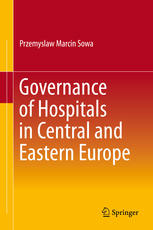

Most ebook files are in PDF format, so you can easily read them using various software such as Foxit Reader or directly on the Google Chrome browser.
Some ebook files are released by publishers in other formats such as .awz, .mobi, .epub, .fb2, etc. You may need to install specific software to read these formats on mobile/PC, such as Calibre.
Please read the tutorial at this link: https://ebookbell.com/faq
We offer FREE conversion to the popular formats you request; however, this may take some time. Therefore, right after payment, please email us, and we will try to provide the service as quickly as possible.
For some exceptional file formats or broken links (if any), please refrain from opening any disputes. Instead, email us first, and we will try to assist within a maximum of 6 hours.
EbookBell Team

4.3
18 reviewsThis book presents a novel view of healthcare system transition in post-communist countries. It is the first region-wide comparative study of hospital governance in Eastern Europe. Comprehensive new material shows the evolution and significance of governance, complementing recent publications on the topic from industrialised countries. Throughout the book, governance is described and substantiated as a major component that, together with provider payment mechanisms, defines the hospital sector’s operations. This view subscribes to the economists’ growing appreciation of extra-financial aspects in the discussion of incentives and regulation of healthcare markets. In particular, the book explains how governance arrangements may affect the outcomes of healthcare financing reforms, and should thus be seen as a critical determinant of their success or failure. This new model of thinking about healthcare system transition emerges from an analysis of 22 countries over the course of two decades. While the primary focus of the study is on developing the hospital sector, an extensive background chapter provides a standalone introduction to the dynamically changing landscape of healthcare in Eastern Europe and an overview of the various problems and challenges the region is facing. Practitioners, policy-makers, academics and students interested in Eastern European healthcare systems, their origins, current status and ways forward, will appreciate the book’s reflections on the problem complexity, the clarity of its concepts, and its accessible style of presentation.